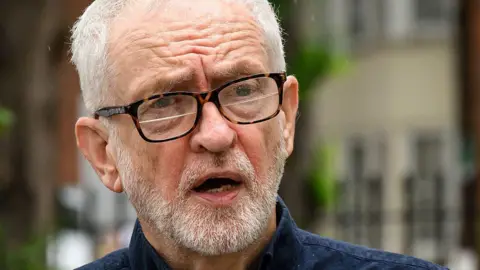The political landscape in the UK is poised for another significant shift as former Labour leader Jeremy Corbyn has announced the launch of a new political party. Corbyn’s intention behind this new venture is to “build a democratic movement that can take on the rich and powerful,” signaling his commitment to addressing socioeconomic disparities. Although the party has not yet been named, Corbyn, the MP for Islington North, aims to field candidates in the upcoming local elections in May, as well as in the next general election predicted to occur in four years.
This new political entity has the potential to reshape electoral dynamics, particularly for established parties like Labour and the Greens, which might see a decrease in their voter bases. A recent poll conducted by More In Common, surveying approximately 2,000 British citizens, noted that up to 10% of respondents indicated they would consider supporting a Corbyn-led party. This potential voter demographic shift could effectively siphon votes away from Labour and extend the lead of alternative parties such as Reform UK.
Luke Tryl, the UK director at More In Common, elaborated on the implications of this polling. He warned that such a fragmenting of the left-wing vote could result in Labour losing seats directly to Corbyn’s new party, while concurrently allowing for gains by Reform UK or the Conservative Party. Tryl noted, “In an era of very fragmented politics, small shares could make the difference across the board.” Thus, the emergence of this new party could significantly influence the political balance between a Labour-led government and one led by Nigel Farage on behalf of Reform UK.
Corbyn’s new venture is expected to appeal strongly in regions where pro-Gaza independents have garnered significant support, including locations like Birmingham and parts of north London and north-west England. Additionally, polling indicates that the under-26 age demographic, particularly students in urban areas, may be receptive to this new political offering. These urban areas are set to experience local elections in May, which will be the inaugural test for Corbyn’s party.
However, the threat posed by a Corbyn-led party is not exclusively directed at Labour. The Green Party is also in a precarious position, as its base may be eroded by this new left-wing movement. The Greens previously garnered substantial support in constituencies in the last general election, often placing second to Labour. If Corbyn’s party attracts former Labour voters, the Greens may struggle to maintain their foothold in these regions.
A possible strategy for the Greens could involve forming electoral pacts with Corbyn’s new party, permitting both groups to withdraw from contesting in seats where the other holds a stronger chance of succeeding. This would foster collaboration among left-wing factions. The four pro-Gaza MPs who allied with Corbyn following the previous general election are anticipated to comprise the core of this new party, along with former Labour MP Zarah Sultana.
Whether formal cooperation will occur between the Greens and Corbyn’s party remains to be seen. Corbyn has signaled a willingness to work with the Green Party, but the specifics of any agreement are still uncertain. James Schneider, a close ally of Corbyn, expressed optimism that collaboration could yield significant benefits, suggesting it would be logical for the new party to form a pact with the Greens.
Conversely, some Green Party members express caution regarding the risk of overshadowing their identity as a distinct political entity focused primarily on environmental issues. Rob Ford, a political science professor at the University of Manchester, emphasized the challenge posed by Corbyn’s high name recognition, noting that he possesses a level of celebrity unmatched within the Green Party. Yet, the ultimate effectiveness of this potential split in the left could depend on how strategically both parties navigate their agendas.
Polls indicate a divided political appetite among voters, with a recent YouGov survey noting that while 18% of respondents expressed openness to supporting a Corbyn-led party, only 9% stated they would not consider voting for any of the existing significant national parties. In the complex dynamics expected to unfold leading to the next general election, voters may opt for tactical voting, particularly if Labour frames the election as a choice solely between Sir Keir Starmer and Nigel Farage.
This nascent political venture has yet to find its footing fully, grappling with questions regarding its leadership and official name. Labour figures have dismissed the viability of Corbyn’s latest initiative, pointing to past electoral defeats as evidence of his diminished appeal. However, Schneider believes the influence of the new party will extend beyond merely securing legislative seats, having already attracted more than 200,000 sign-ups in less than a day.
Overall, while the future remains uncertain, the potential impact of Corbyn’s new political entity on the UK political landscape could usher in dramatic changes, making for an intriguing and unpredictable electoral scenario. As Schneider eloquently stated, “We’re going to be having a huge outside influence on the political debate in this country,” encapsulating the enthusiasm that underscores this ambitious undertaking.











